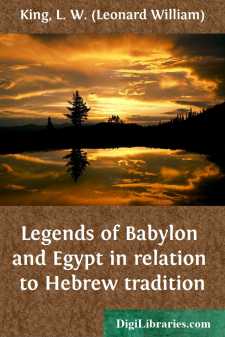Categories
- Antiques & Collectibles 13
- Architecture 36
- Art 48
- Bibles 22
- Biography & Autobiography 813
- Body, Mind & Spirit 142
- Business & Economics 28
- Children's Books 17
- Children's Fiction 14
- Computers 4
- Cooking 94
- Crafts & Hobbies 4
- Drama 346
- Education 46
- Family & Relationships 57
- Fiction 11829
- Games 19
- Gardening 17
- Health & Fitness 34
- History 1377
- House & Home 1
- Humor 147
- Juvenile Fiction 1873
- Juvenile Nonfiction 202
- Language Arts & Disciplines 88
- Law 16
- Literary Collections 686
- Literary Criticism 179
- Mathematics 13
- Medical 41
- Music 40
- Nature 179
- Non-Classifiable 1768
- Performing Arts 7
- Periodicals 1453
- Philosophy 64
- Photography 2
- Poetry 896
- Political Science 203
- Psychology 42
- Reference 154
- Religion 513
- Science 126
- Self-Help 84
- Social Science 81
- Sports & Recreation 34
- Study Aids 3
- Technology & Engineering 59
- Transportation 23
- Travel 463
- True Crime 29
Legends of Babylon and Egypt in relation to Hebrew tradition
Categories:
Description:
Excerpt
PREFACE
In these lectures an attempt is made, not so much to restate familiar facts, as to accommodate them to new and supplementary evidence which has been published in America since the outbreak of the war. But even without the excuse of recent discovery, no apology would be needed for any comparison or contrast of Hebrew tradition with the mythological and legendary beliefs of Babylon and Egypt. Hebrew achievements in the sphere of religion and ethics are only thrown into stronger relief when studied against their contemporary background.
The bulk of our new material is furnished by some early texts, written towards the close of the third millennium B.C. They incorporate traditions which extend in unbroken outline from their own period into the remote ages of the past, and claim to trace the history of man back to his creation. They represent the early national traditions of the Sumerian people, who preceded the Semites as the ruling race in Babylonia; and incidentally they necessitate a revision of current views with regard to the cradle of Babylonian civilization. The most remarkable of the new documents is one which relates in poetical narrative an account of the Creation, of Antediluvian history, and of the Deluge. It thus exhibits a close resemblance in structure to the corresponding Hebrew traditions, a resemblance that is not shared by the Semitic-Babylonian Versions at present known. But in matter the Sumerian tradition is more primitive than any of the Semitic versions. In spite of the fact that the text appears to have reached us in a magical setting, and to some extent in epitomized form, this early document enables us to tap the stream of tradition at a point far above any at which approach has hitherto been possible.
Though the resemblance of early Sumerian tradition to that of the Hebrews is striking, it furnishes a still closer parallel to the summaries preserved from the history of Berossus. The huge figures incorporated in the latter's chronological scheme are no longer to be treated as a product of Neo-Babylonian speculation; they reappear in their original surroundings in another of these early documents, the Sumerian Dynastic List. The sources of Berossus had inevitably been semitized by Babylon; but two of his three Antediluvian cities find their place among the five of primitive Sumerian belief, and two of his ten Antediluvian kings rejoin their Sumerian prototypes. Moreover, the recorded ages of Sumerian and Hebrew patriarchs are strangely alike. It may be added that in Egypt a new fragment of the Palermo Stele has enabled us to verify, by a very similar comparison, the accuracy of Manetho's sources for his prehistoric period, while at the same time it demonstrates the way in which possible inaccuracies in his system, deduced from independent evidence, may have arisen in remote antiquity. It is clear that both Hebrew and Hellenistic traditions were modelled on very early lines.
Thus our new material enables us to check the age, and in some measure the accuracy, of the traditions concerning the dawn of history which the Greeks reproduced from native sources, both in Babylonia and Egypt, after the conquests of Alexander had brought the Near East within the range of their intimate acquaintance....


